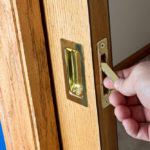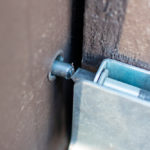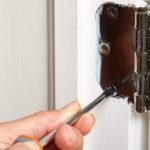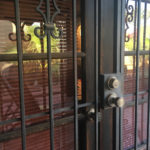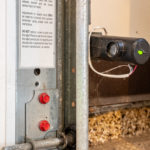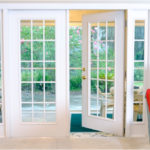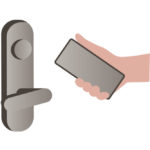The sliding barn door is a popular way to decorate an indoor space with rustic charm. The classic design gives even modern interiors a bit of farmhouse chic, and can also be a great way to save space. However, that lovely slide comes with a downside.
Sliding barn doors don’t always come with a lock installed. Due to the unique movement of the door, many will simply slide into place without locking. This makes them less secure, and it also takes away some privacy. Even in our own homes, it’s always nice to be able to lock the door.
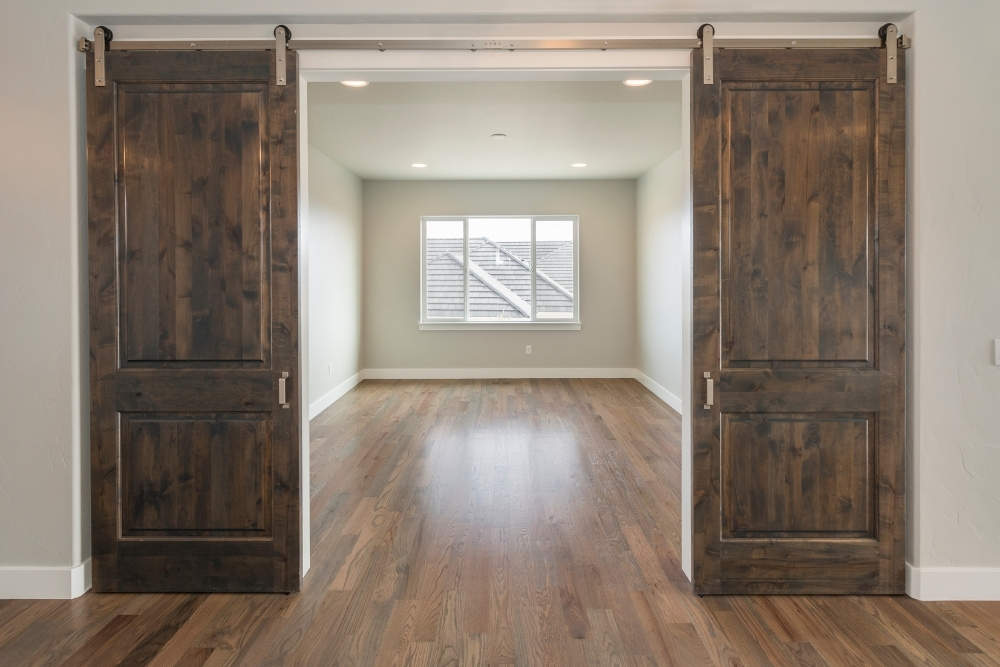
Luckily, there are some simple solutions to the problem. Installing a lock on a sliding door can be quick and easy, and simple styles match the rustic feel of barn wood. A hook and eye lock can solve all your privacy needs, while a hasp lock offers some extra security.
In this guide, we help you find the solution you need to lock your sliding barn door.
Hook And Eye Locks
The hook and eye lock is a simple and effective way for locking a sliding barn door. They have a classic finish, which works well in a rustic home, and perfectly matches the barn door style.
Installing a hook and eye lock is easy, and there are so many options for sale you’re sure to find one that suits you. For extra security, a version like this uses four screws to anchor the lock into place. When installing, make sure the door is flush against the frame, for a tight fit and increased privacy.
Another advantage to the hook and eye lock is that it can work at unusual angles. If you’ve installed a sliding barn door as a space-saving solution, then this simple mechanism can help you maintain that extra layer of privacy.
Gate Latch
The gate latch is designed very similarly to the hook and eye, and it’s as easy to install. The advantage of this lock is that it offers a little more stability over the hook and eye, and once locked into place, it prevents movement. The gate latch also works better over a double sliding door.
The gate latch offers better privacy, but it isn’t ideal for security. Unless the doors are completely flush, it’s possible to lift the bolt from the other side using a thin object. However, it certainly keeps the door in place, and stops any unwanted sliding.
For extra security, it’s possible to get flip latches that can be used alongside a padlock. These latches have locking holes at the base, which a padlock can be threaded through.
That way, even if someone can pull the latch up, the padlock prevents movement. As it can be used with or without the padlock, it’s a good choice for side doors.
90 Degree Flip Latch
With a 90 degree flip latch, there’s a great versatility for how you lock the door. Whether your barn door slides left or right, the flip latch can be rotated to match the closing mechanism. It can even be used at the top of the door, which can be surprisingly useful depending on the room shape.
The extra locking mechanism provided by a latch such as this one adds to the safety and privacy. A 90 degree flip latch is particularly useful in the bathroom, because it locks securely and moves smoothly.
The slightly bulky design can still look good on a sliding barn door, and the simplicity works with the cottage charm.
Teardrop Sliding Lock
The teardrop lock is a popular choice for the sliding barn door, because it looks good but is unobtrusive. It’s particularly useful in the bathroom or bedroom, because it offers a little more privacy than other simple designs.
This sliding lock consists of two pieces: a teardrop shape which attaches to the wall or door frame, and a slot that attaches to the door. The teardrop then slides into the slot, keeping the door shut, so you can get some privacy.
For indoor use, this lock is very popular because of the interesting design. Be aware of the gap between your door and door frame, however. If there’s more than an inch of space, the lock won’t reach the slot.
Barrel Bolt Slide Latch
Sometimes, simple really is best. The barrel sliding latch may not be the most impressive of locking mechanisms, but it does keep a door shut.
As with the hook and eye, the barrel slide latch comes in such a range of designs that it’s easy to find one that matches your door. When installing, take care to ensure that the lock and latch line up perfectly.
These designs often have slightly extra security, because they use more screws across the body, stopping it from being pulled loose.
Hasp And Padlock
If you have a sliding barn door outside, privacy is less important than safety. You need a lock that can keep the door closed, and halt potential break-ins. The hasp door latch may not be complicated, but combined with a strong padlock, it can effectively keep your door closed.
Installing a hasp is simple, but it’s important to be careful. The door needs to be flush to the frame, to prevent the screws from being pried out. For a similar reason, you may want to buy longer screws – just make sure they don’t come out the other side of the door.
Then, the only thing that matters is the strength of your padlock. Look for reinforced metal and a covered shackle.
Choosing The Right Lock For Your Sliding Barn Door
When choosing the right lock for your sliding barn door, you need to consider what feature is most important to you. Whether that’s privacy, security, design, or easy installation, there’s sure to be a lock that’s perfect.
Before making your choice, consider the room the door is in, and whether it faces the outside. Although the sliding barn door may not automatically come with a lock, there are plenty it can be used with.

